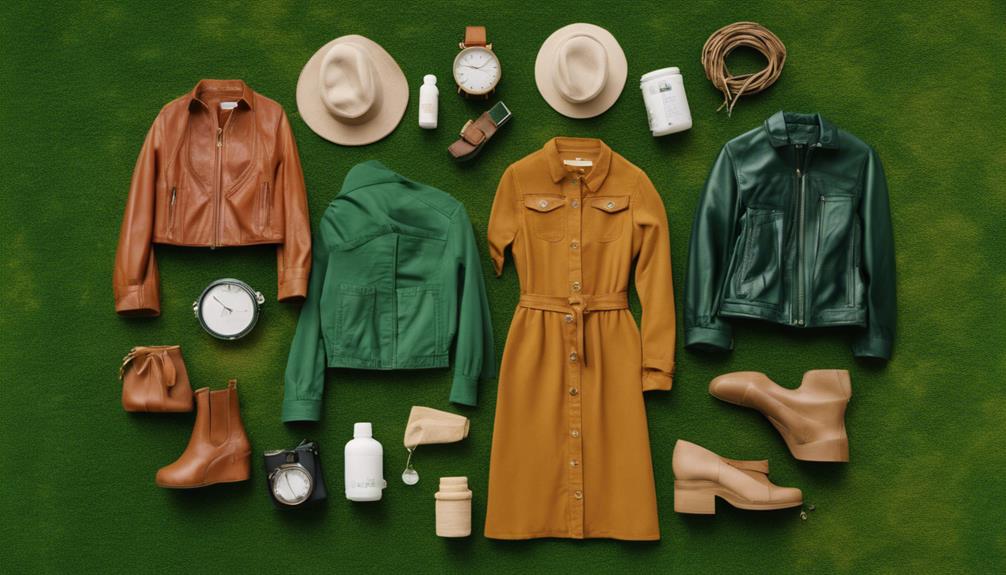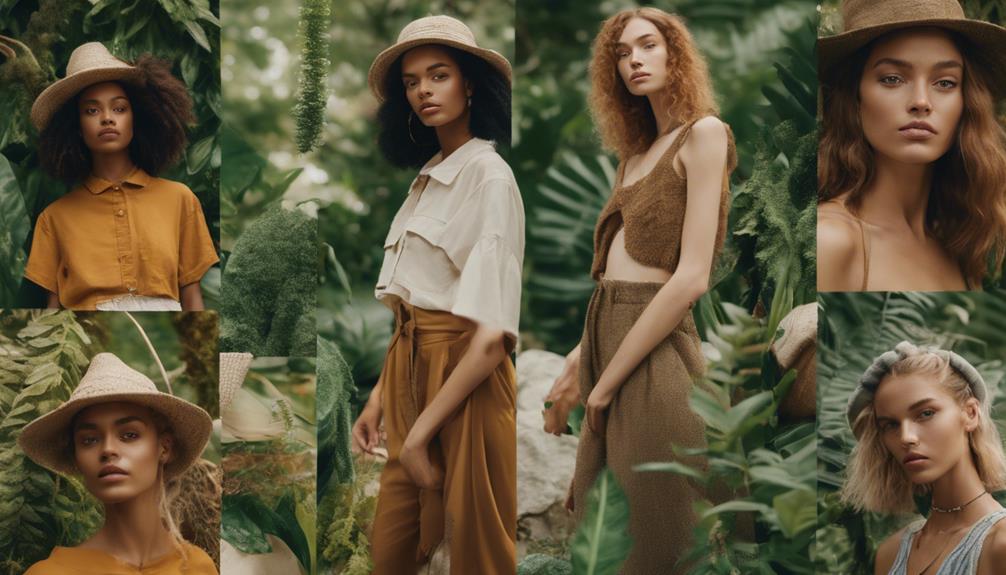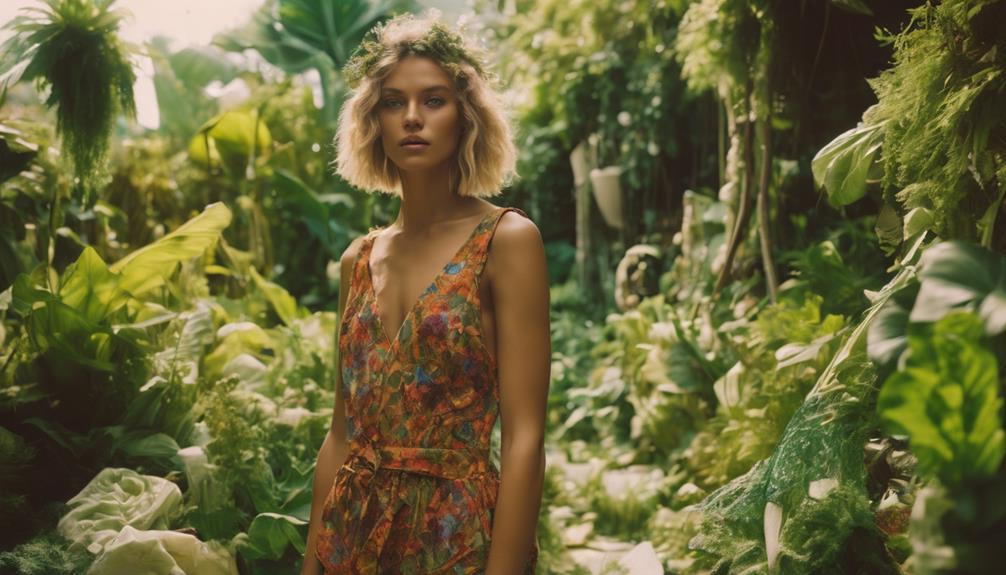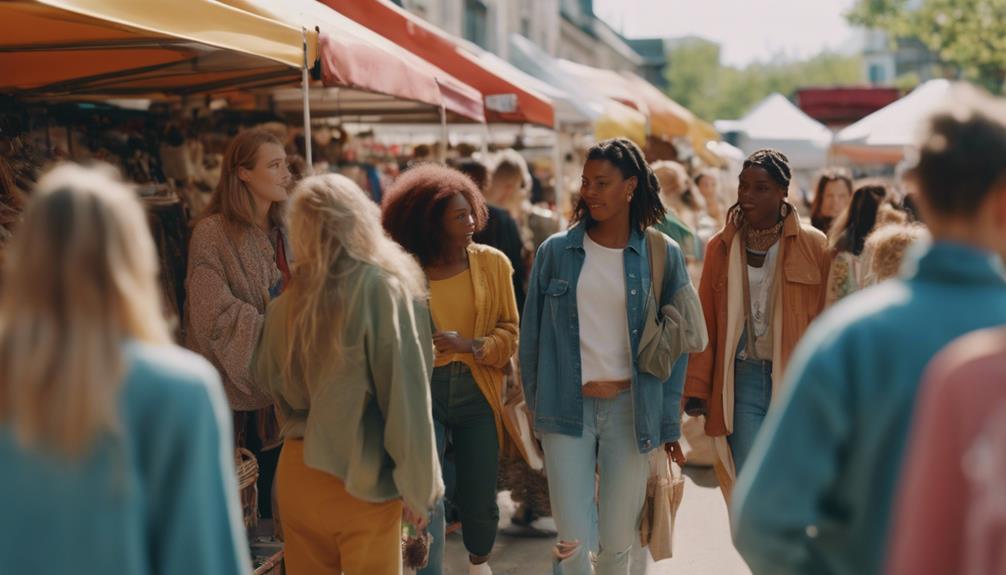Get ready to be impressed by some of the top sustainable fashion brands that are currently making a splash! Companies like Patagonia and Reformation are dedicated to using eco-friendly materials, while Everlane is known for its transparent pricing. If you’re on a budget, Pact and Boody offer stylish options made from organic cotton. Leading the way in circular fashion are brands like tentree and Eileen Fisher, who prioritize recycling and ethical production. Additionally, many brands are championing size inclusivity to ensure that everyone can find fashionable pieces that fit them. Whether you’re browsing vintage gems on Etsy or indulging in luxury labels like Chloé, there’s something for every style preference. Stay tuned to discover even more amazing brands that are shaping a sustainable future!
Key Takeaways
- Pact and Boody prioritize organic materials, offering basics made from GOTS-certified organic cotton and OEKO-TEX® certified bamboo, respectively.
- tentree plants ten trees for every product sold, supporting a circular economy with biodegradable materials.
- Eileen Fisher promotes ethical production using organic and recycled materials while encouraging recycling through take-back programs.
- People Tree and Nisolo showcase fair trade certifications, ensuring fair wages and safe conditions for workers.
Budget-Friendly Sustainable Brands
You can find budget-friendly sustainable brands that not only prioritize eco-conscious materials but also offer stylish options for every body type. Brands like Pact make it easy to embrace sustainability, providing basics crafted from GOTS-certified organic cotton. Their eco-friendly packaging reinforces their commitment to the planet, ensuring that you don't have to compromise on style or ethics.
Fair Indigo also shines with its affordable clothing made from biodegradable materials and certified organic cotton. Plus, your purchases help support the Fair Indigo Foundation, contributing to meaningful social initiatives.
If you're looking for transparency in pricing, Everlane's approach is impressive. They offer size-inclusive styles from XS to XXL at budget-friendly prices while maintaining eco-conscious packaging.
For those who appreciate Fair Trade principles, Yes Friends delivers with affordable clothing made in solar-powered factories, emphasizing organic and recycled fabrics.
Finally, Boody specializes in basics made from OEKO-TEX® certified bamboo, ensuring size inclusivity from XS to 4XL.
With these brands, you can build a sustainable wardrobe without breaking the bank.
Organic Material Focus

Shifting from budget-friendly options, many sustainable fashion brands focus on organic materials that not only benefit the planet but also enhance the quality and comfort of your wardrobe. By prioritizing GOTS-certified organic cotton, these brands reduce harmful pesticide use and promote eco-friendly farming practices. For instance, Pact and Boody incorporate biodegradable organic bamboo viscose into their collections, providing you with comfortable basics while minimizing environmental impact.
When you choose brands like Kotn, you support ethical sourcing as they give back to Egyptian communities while offering budget-friendly options made from organic materials. This connection between fashion and community highlights the significance of conscious consumerism. Additionally, Amour Vert takes their commitment further by planting a tree for every t-shirt sold, reinforcing the link between sustainable fashion and environmental stewardship.
Thought Clothing emphasizes natural, sustainable materials, including GOTS-certified organic cotton, ensuring that your wardrobe remains stylish and eco-conscious. By opting for these sustainable clothing brands, you not only elevate your style but also contribute to a healthier planet. Embracing organic materials in your fashion choices can lead to a more sustainable and responsible lifestyle.
Circular Fashion Leaders

In the domain of sustainable fashion, circular fashion leaders are redefining the industry by prioritizing waste reduction and promoting practices that guarantee garments are recycled, reused, or repurposed.
Brands like tentree exemplify this commitment by planting ten trees for every product sold and using biodegradable materials, which supports a circular economy.
Eileen Fisher is another key player, focusing on ethical production through the use of organic and recycled materials. Their take-back programs encourage recycling and assure that garments have a second life.
Reformation aims for climate-positive status by 2025, utilizing sustainable and regenerative fabrics while providing detailed information on the environmental impact of their products.
Patagonia emphasizes durability, promoting the idea that consumers should repair rather than replace their clothing, which aligns perfectly with circular fashion principles.
Outerknown, founded by pro surfer Kelly Slater, also champions circular fashion through initiatives like the Outerworn program, facilitating the recycling and resale of clothing.
These brands not only highlight the importance of sustainable materials but also demonstrate that a commitment to circular fashion can foster a more responsible and environmentally friendly industry.
Ethical Labor Practices

When you choose sustainable fashion, you're not just considering the environment; you're also supporting ethical labor practices.
Brands like People Tree and Nisolo showcase fair trade certifications and supply chain transparency, ensuring workers are treated fairly.
Fair Trade Certifications
Fair Trade certifications guarantee that the workers behind your favorite sustainable fashion brands earn fair wages and work in safe conditions. By choosing brands with these certifications, you're supporting ethical labor practices that promote social and economic equity. For instance, People Tree, a pioneer in sustainable fashion, emphasizes transparency and adheres to Fair Trade standards in their supply chain.
These certifications require brands to undergo regular audits and assessments, ensuring compliance with labor standards and ethical guidelines. This process not only safeguards workers but also fosters empowerment by providing opportunities for marginalized communities, leading to improved livelihoods through fair wages and job security.
Moreover, certified Fair Trade brands typically prioritize the use of organic and sustainable materials in their production processes. This alignment with environmental goals enhances the overall impact of your fashion choices.
Supply Chain Transparency
Supply chain transparency is essential for ensuring ethical labor practices in the fashion industry, as it allows consumers to know exactly how and where their clothing is made.
Brands like People Tree have set the standard by being the first to receive the World Fair Trade Organization label, confirming fair wages and ethical conditions in their supply chain.
Nisolo takes it a step further, providing detailed insights about their artisan supply chains, ensuring that their footwear and accessories are produced ethically.
Patagonia, a founding member of the Fair Labor Association, routinely audits its factories to maintain compliance with fair labor practices, showcasing their commitment to transparency.
Similarly, Outerknown partners with Fair Trade Certified factories, ensuring safe working conditions and fair wages for workers.
Tentree stands out as a certified B Corp, reflecting rigorous social and environmental performance standards. This certification also highlights their commitment to transparency in their supply chain and ethical practices.
Size Inclusivity Initiatives
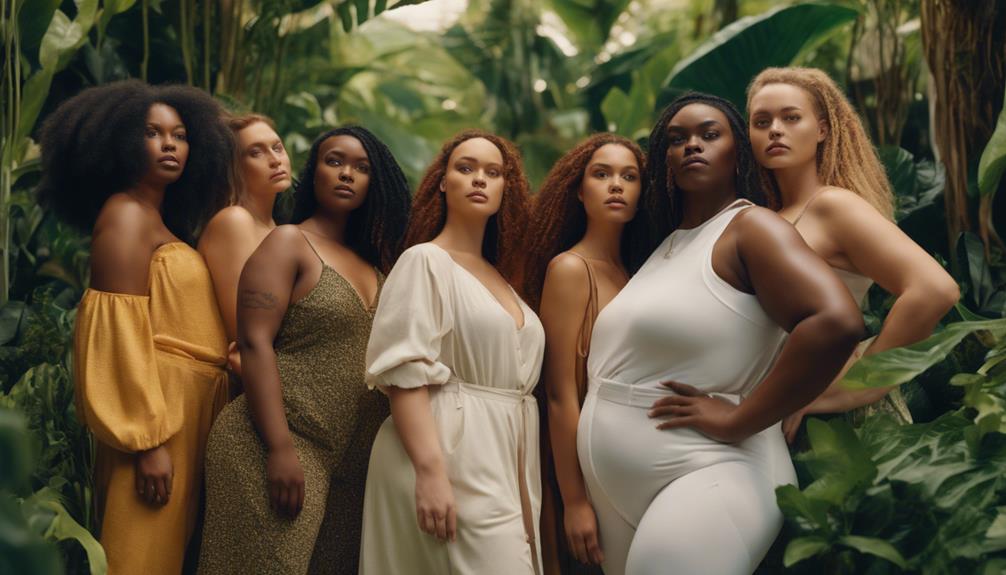
When you shop sustainable fashion, you'll notice many brands are expanding their size options to cater to all body types.
Inclusive design practices guarantee that everyone can find stylish, eco-friendly clothing that fits well.
This commitment to size inclusivity not only embraces diversity but also makes sustainable fashion accessible to a broader audience.
Expanding Size Options
Sustainable fashion brands are increasingly prioritizing size inclusivity by offering a diverse range of sizes, making certain everyone can find eco-friendly options that fit well. Brands like Warp + Weft lead the way, providing sizes from XS to 3XL (up to US 24), allowing more individuals to access stylish, sustainable clothing.
Yes Friends and Reformation also shine in this area, featuring offerings from XXS to XXL, which encourages a wider audience to embrace ethical fashion brands. Additionally, Boody focuses on comfort with sizes ranging from XS to 4XL, guaranteeing their sustainable clothing caters to various body shapes.
MATE the Label and Proclaim are similarly committed to this initiative, emphasizing that sustainable fashion should be available for all sizes. Brands like Sézane and Everlane understand the importance of size inclusivity too, offering a range that accommodates diverse body types while maintaining their sustainability goals.
Inclusive Design Practices
Many brands are now adopting inclusive design practices to guarantee their eco-friendly clothing meets the needs of all body types.
Size inclusivity is becoming a hallmark of sustainable fashion brands, ensuring that everyone can find stylish, environmentally responsible options. For instance, Warp + Weft offers an impressive 75 sizes, ranging from XS to 3XL, which caters to diverse body shapes.
Reformation and Yes Friends also champion size inclusivity, featuring collections that span from XXS to 3X, promoting accessibility in eco-friendly fashion.
Everlane follows suit with a range from XS to XXL (up to US 20), making sustainable choices available to a broader audience.
Boody emphasizes comfort and fit by offering sizes from XS to 4XL, utilizing sustainable bamboo materials in its designs.
Similarly, Proclaim and MATE the Label provide size-inclusive options from XS to 4XL, further supporting diversity in sustainable fashion.
Vintage and Pre-Loved Options
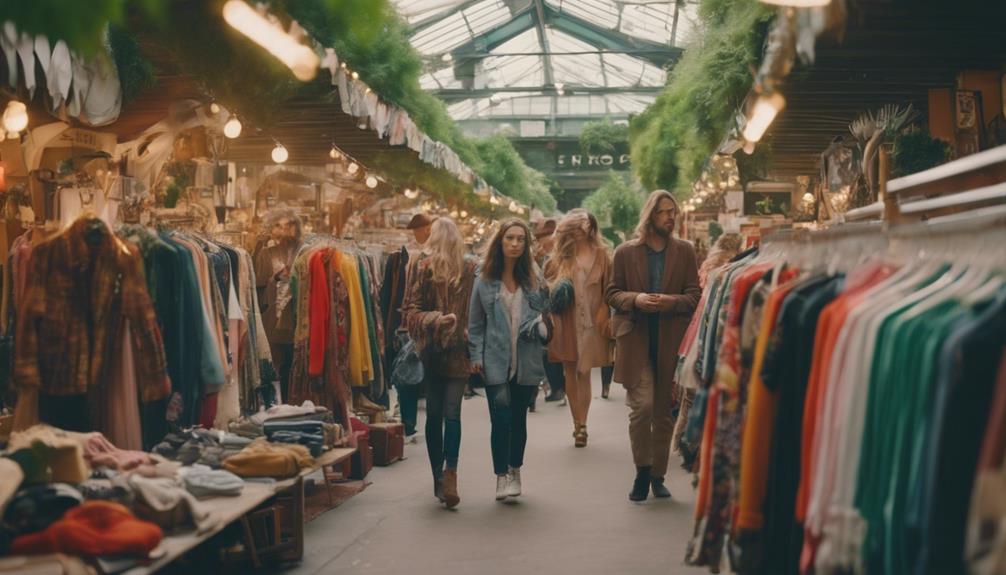
Embracing vintage and pre-loved clothing not only gives you unique style options but also plays a crucial role in reducing waste and combating the environmental impacts of fast fashion. By choosing these sustainable alternatives, you're extending the lifecycle of garments that might otherwise end up in landfills. Every pre-loved piece you buy decreases the demand for new clothing production, which helps lower carbon emissions from manufacturing.
Brands like Christy Dawn are making strides in this area by utilizing deadstock fabrics for their vintage-inspired pieces, ensuring that unused materials are given a new life. Toad & Co champions a circular fashion model, offering a curated selection of vintage and pre-loved clothing that appeals to eco-conscious shoppers like you.
Platforms such as Etsy provide fantastic marketplaces for vintage and handmade apparel, allowing you to support independent creators while making sustainable fashion choices. The next time you're on the hunt for something new, consider exploring vintage and pre-loved options. You'll not only find something special but also contribute to a more sustainable future in fashion.
Innovative Sustainable Solutions

Exploring vintage and pre-loved options is just one way to make a positive impact; innovative sustainable solutions in fashion are paving the way for a more eco-friendly future. Brands like Pangaia are taking bold steps by using bacteria for dyes and transforming carbon emissions into materials. Their approach demonstrates a commitment to sustainability that's hard to ignore.
Christy Dawn stands out by employing deadstock fabric and organic cotton while partnering with the Oshadi Collective to restore land and boost biodiversity. This ethical collaboration highlights the importance of sustainable practices in fashion.
Similarly, Girlfriend Collective creates activewear from recycled plastic water bottles, showcasing a circular approach that reduces waste and promotes sustainability. Ninety Percent takes ethics a step further by donating 90% of its profits to charity, while utilizing sustainable materials like Tencel and SeaCel.
Last but not least, Outerknown, founded by pro surfer Kelly Slater, emphasizes circular fashion through its Outerworn program, encouraging you to return used items. These innovative solutions not only redefine the fashion industry but also inspire you to make more responsible choices.
Marketplace Highlights

The sustainable fashion marketplace is thriving, offering eco-friendly options that cater to diverse styles and budgets. You'll find an array of sustainable brands that prioritize ethical practices and environmental responsibility.
For instance, Amazon's in-house brand, Aware, provides carbon-neutral products made from 50% recycled or organic materials, available in inclusive sizing from XXS to 7X. Etsy shines as a platform for vintage and handmade apparel, supporting small businesses while offsetting 100% of its carbon emissions.
If you're looking for budget-friendly options, brands like Pact and Boody offer eco-friendly clothing made from GOTS-certified organic cotton and commit to fair trade practices. For those who want to minimize clothing waste, Rent the Runway gives you access to a diverse wardrobe without the commitment of ownership. You can rent stylish pieces while promoting reuse.
Additionally, you can find well-known sustainable brands like prAna and Threads4Thought on Amazon, both focusing on ethical production and environmentally friendly materials. The marketplace is filled with choices that not only look good but also do good for the planet.
Family-Owned Brands
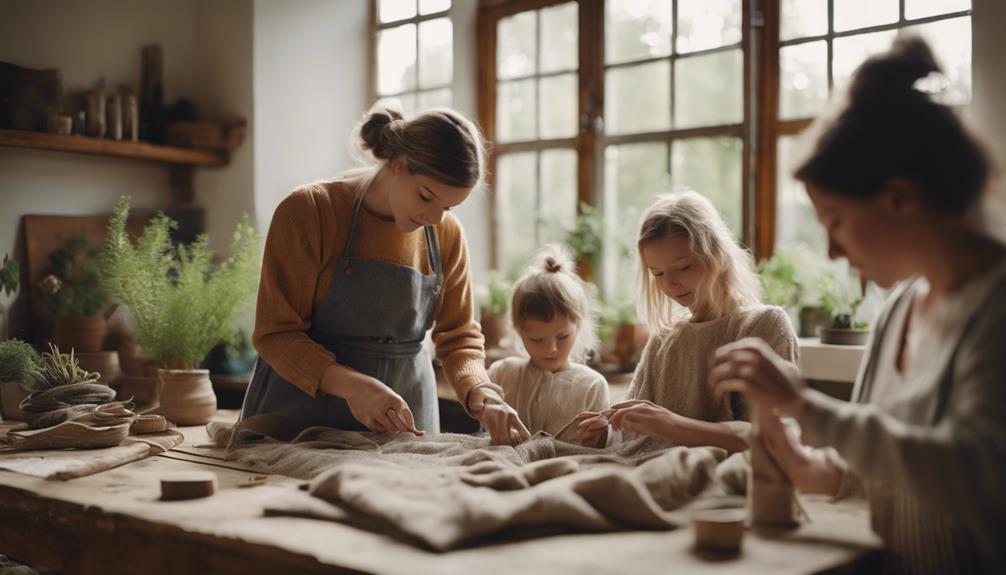
Family-owned brands consistently prioritize sustainability and ethical practices, offering consumers a compassionate choice in fashion. These brands often have a deep-rooted commitment to their communities and the environment, making them stand out in the sustainable clothing landscape.
Take MagicLinen, for example. This family-owned business produces biodegradable linen clothing while using eco-friendly packaging to minimize waste.
Similarly, Colored Organics focuses on organic cotton baby essentials and supports Fair Trade practices, ensuring ethical production and a positive community impact.
Aventura, another family-run brand, emphasizes sustainability, with over 75% of its collection crafted from lower-impact materials.
If you're looking for vintage-inspired pieces, Christy Dawn creates stunning clothing using deadstock fabrics and commits to ethical labor practices, highlighting timeless design.
Lastly, Boody specializes in affordable, eco-friendly basics made from organic bamboo. This family-owned brand is also certified B Corp, showcasing its dedication to ethical practices.
Choosing family-owned brands means you're not just buying sustainable clothing; you're also supporting businesses that care about their impact on the planet and their communities.
High-End Sustainable Designers
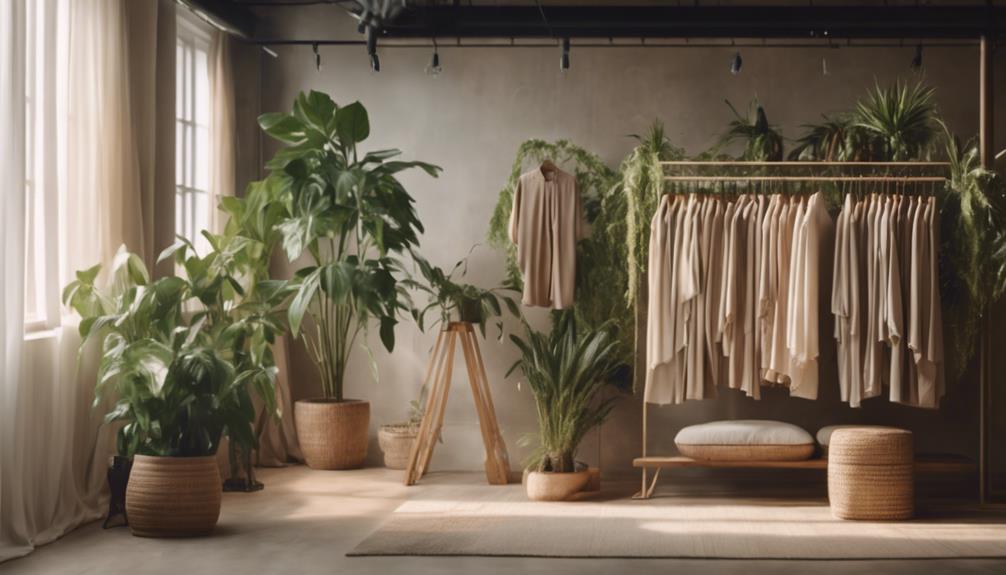
High-end sustainable designers are making waves in the fashion industry by merging luxury with eco-conscious practices, proving that style and sustainability can go hand in hand. Brands like Chloé lead the charge, becoming the first luxury house to achieve B Corp certification, showcasing a commitment to reducing carbon footprints and using upcycled materials.
Pangaia takes a scientific approach, incorporating innovative methods like using bacteria for dyes and transforming carbon emissions into biodegradable materials.
Patagonia stands out as a founding member of the Fair Labor Association, with 90% of its fabrics sourced from eco-friendly materials. Its focus on durability minimizes waste, aligning luxury with responsibility.
People Tree pioneers fair trade practices, emphasizing transparency and fair wages across its supply chain, making a significant impact on ethical fashion.
Lastly, Ninety Percent engages customers by donating 90% of its profits to chosen charities while focusing on sustainable materials like Tencel and SeaCel.
These high-end sustainable designers not only elevate your wardrobe but also contribute to a better world, proving that luxury can indeed be ethical and sustainable.
Frequently Asked Questions
What Fashion Brand Is the Most Sustainable?
When considering which fashion brand is the most sustainable, you'll find Patagonia often leads with its eco-friendly materials and Fair Trade practices. However, brands like Pangaia and tentree also showcase impressive sustainability efforts worth exploring.
Is Zara Sustainable or Fast Fashion?
Zara's like a treadmill—constantly churning out new styles, yet you're not really going anywhere sustainable. While they've pledged some eco-initiatives, their fast fashion model still undermines genuine sustainability efforts.
What Is a Sustainable Fashion Brand?
A sustainable fashion brand focuses on eco-friendly materials and ethical practices, minimizing environmental impact. You'll find they prioritize recycling, inclusivity, and community support, ensuring their products contribute positively to both people and the planet. Sustainable fashion brands are committed to transparency in their supply chains and emphasize fair labor practices. By investing in sustainable fashion, consumers can feel good about the products they purchase, knowing they are making a positive impact on the world. As the demand for sustainable fashion continues to grow, more brands are emerging with a focus on ethical and eco-friendly practices.
What Is the Most Sustainable Piece of Clothing?
Did you know that organic cotton uses 91% less water than conventional cotton? The most sustainable piece of clothing often features organic materials or recycled fabrics, minimizing environmental impact while promoting a healthier planet for everyone.
Conclusion
As you explore these sustainable fashion brands, remember that your choices can drive change.
Each purchase you make sends a message about the kind of world you want to support.
By opting for brands that prioritize ethical practices, inclusivity, and innovative solutions, you're not just dressing yourself; you're contributing to a more sustainable future.
The truth is, every small decision counts—your wardrobe can be a powerful tool for positive impact.
So, wear your values proudly!
